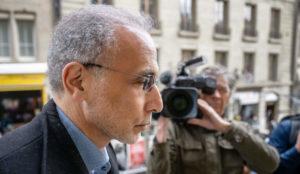Now that Tariq Ramadan, that “towering intellect” who is “one of the seven most important religious innovators of the 21st century,” has just completed his first trial in Geneva, there are many more such trials to come. There are still four women in that city whom he is charged with sexually assaulting when they were his students at a lycée in Geneva. And there are another four women in France, three of them Muslims, who are still waiting for Ramadan to be tried for what he did to them.
Sponsored Images





Before reviewing their charges, it should be noted that it took great courage for them to come forward. Ramadan’s fame, his access to money, his two million followers on Facebook, make him a formidable enemy. The government of Qatar backs him to the hilt. And it is reasonable to worry about the reaction of his followers to one or more of his accusers should he receive a long sentence. Henda Ayari, who was the first to accuse Ramadan, has received thousands of death threats from Ramadan’s most fanatical supporters, and is now under 24-hour guard — and may be for years to come. Ramadan’s followers have tried to depict her as a publicity hound, intent on accusing Ramadan in order to sell more copies of her book (I Chose Freedom), in which she claims that Tariq Ramadan — whom she was too frightened to name — appears as the monstrous character “Zoubeyr.”

Nobody seems to have bought this attempt to slander Ayari, and for good reason. Who in their right mind would seek publicity if it meant thousands of death threats and the need for round-the-clock security? Ramadan’s lawyers have similarly savaged another accuser, “Christelle,” trying without success to punch holes in her testimony, while his followers suggest that she and Ayari might be part of the same plot against Ramadan, possibly directed by “Zionists.” But this absurd charge of a “Zionist plot” never did gain traction, given all the evidence against him, and given, too, that Ramadan’s accusers in France have mostly been Muslims.
When the first set of Ramadan’s accusers came forward, Eugene Rogan, the then-director of the Middle East Centre at Oxford where Ramadan taught, explained his initial decision to allow Tariq Ramadan to continue teaching at Oxford: “It’s not just about sexual violence. For some students it’s just another way for Europeans to gang up against a prominent Muslim intellectual. We must protect Muslim students who believe and trust in him, and protect that trust.” By doing what? Apparently, by letting him off the hook, keeping him on the Oxford faculty in good standing, not letting Ramadan’s accusers control the narrative. Shouldn’t Rogan instead have been busy informing the Muslim students at the Middle East Centre that there was no “gang up” against Ramadan, no “Zionist plot”?

His accusers came forward, obviously with palpable fear, and only dared to do so several years after the sexual violence and rapes, for they had been frightened by the threats Ramadan made, that “if they dared say anything” about what he had done, harm could come to them. He threatened to blackmail one victim with compromising photos he possessed. The terrifying violence he inflicted on these women gave them every reason to believe that he would carry out such threats. Ayari was the first to break through her own carapace of fear, and then the other women followed. Indeed, her revelation about Ramadan came in two stages. First, she described in detail the behavior of Ramadan (“Zoubeyr”), a man whom she had so admired, once she was alone with him in his hotel room:
“This man, Zoubeyr, transformed before my very eyes into a vile, vulgar, aggressive being – physically and verbally,” she wrote. “For modesty, I will not give the precise details here of the acts he made me submit to. But it is enough that he took great advantage of my weakness and the admiration I felt for him. ”
“He allowed himself gestures, attitudes and words that I could never have imagined.”
“And when I resisted,” she writes, “when I cried to him to stop, he insulted and humiliated me. He slapped me and attacked me. I saw in his crazy eyes that he was no longer master of himself. I was afraid he would kill me. I was completely lost. I started crying uncontrollably. He mocked me.”

These statements, and others from Henda Ayari, described his violence: “He choked me so hard that I thought I was going to die.” She also described him as threatening that her children might be harmed if she were tell anyone.
His other victims also described Ramadan as violent and threatening.
Tariq Ramadan is also accused of raping another woman in a hotel room in 2009. The unnamed 42-year-old, who is reported to have disability in her legs, said that the professor had subjected her to a terrifying and violent sexual assault.
A third complainant, identified as Yasmina, told Le Parisien in an interview on Saturday that Mr Ramadan sexually harassed her in 2014 and blackmailed her for sexual favors.
There is still a fourth woman, a Belgian known as Sarah, who is apparently thinking of filing a complaint, according to the RTBF radio network. In testimony about her relationship with Ramadan, she said she was scared for her life. “He can be very, very violent, grabbing you very violently, expecting from you any sexual practice and demanding it aggressively enough, and then it comes down again, but these moments are very difficult to live.”
The same extreme physical violence, including grabbing and choking, the same threats, the same aggressive and humiliating sexual demands, including rape — his modus operandi appears to have always been the same.
But as we have seen, these were mostly Muslim women, not “Europeans” with a score to settle against Islam; nor did they “gang up” on Ramadan. There was no plot to bring him down. It was only with difficulty that they managed to summon up the courage to denounce this powerful monster, who with his connections and ability to tap the enormous wealth of his Muslim admirers, especially the government of Qatar, to pay for the best lawyers, will certainly do all he can to blacken his accusers’ names and brazenly deny everything.
It turns out that Ramadan’s enormous sexual appetites were known to a few in the French government:
On hearing of the charges of rape against Ramadan, Bernard Godard, an Islamic expert, known as the “Monsieur Islam” at the French Ministry of the Interior, where he served from 1997 to 2014, told the French magazine L’Obs that while “he [Ramadan] had many mistresses, that he consulted sites, that girls were brought to the hotel at the end of his lectures, that he invited them to undress, that some resisted and that he could become violent and aggressive, yes, but I have never heard of rapes, I am stunned.”
Surely it is we who should be stunned at the apparent willingness of the French government to protect Tariq Ramadan’s public image from being sullied, even though everyone advised by “Monsieur Islam” knew for years that Ramadan was a sexual predator, with multiple mistresses, a penchant for prostitutes (ordered up from those “sites” he consulted), and girls (both groupies and call girls) “brought to the hotel” after his lectures, as a kind of extra honorarium, and if those girls resisted, “he could become violent and aggressive.” Why did the French government allow this to go on? Why did it not investigate to find out more about Ramadan’s behavior? Why did Monsieur Godard claim to be “stunned” by the charges of rape when everything he admits he did know about Ramadan surely points ineluctably in that direction?
Now Ramadan has finally had his first trial for rape of a woman – a Muslim woman – in a hotel in Geneva. It is the start of a long process for the predator with his wolfish smile. There are still those four Swiss women who accuse him of having sexually assaulted them when they were his students in a Geneva lycée. There are four women in France – at least three of them Muslims – who have been waiting for their cases to be heard by a criminal court. Ramadan’s squalid and sordid existence will be on display for all to see. I don’t think we’ll be hearing any more in the Western press about this former “towering intellect” or about his being “one of the seven most important religious innovators of the 21st century, ” or about his being named one of the “100 Most Influential Thinkers In the World.” And he won’t be going back to Oxford. But don’t worry about Tariq Ramadan. When he is finally out of jail, well-paid sinecure awaits him in the place he really belongs: Doha, Qatar.
Dear Readers, Good and credible news reportage is tedious task and requires huge finances.
We are soliciting your Noble support for as low as N1,000 your support would go a long way in assisting us to continue to guarantee our readers quality news.
Bank transfers can be made to:
Account Name: Harvest and Commercial
Bank: Sterling Bank
Account Number: 0078627735